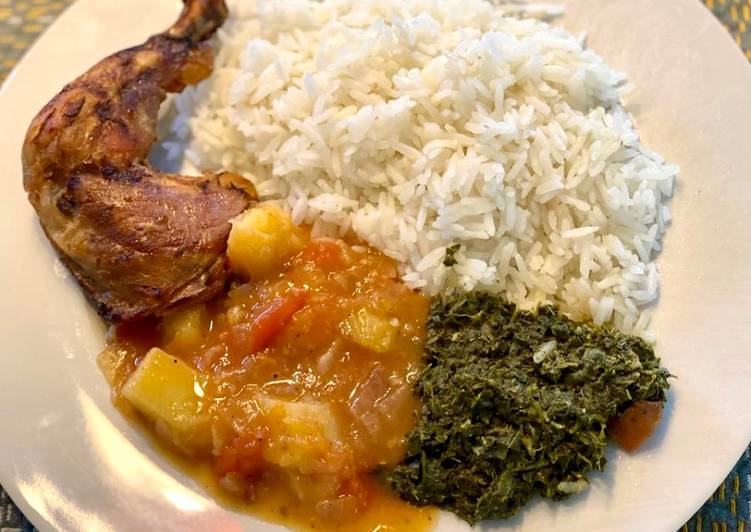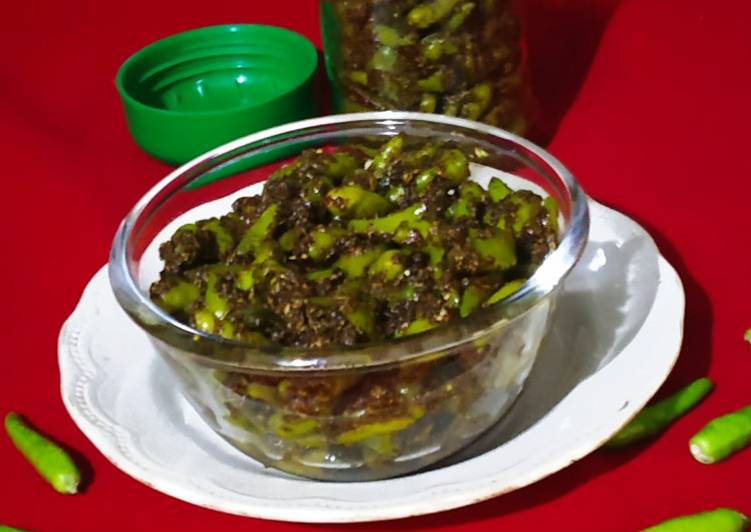
Hello everybody, it is John, welcome to our recipe page. Today, I’m gonna show you how to make a special dish, cassava leaves (kisamvu) and potato & tomato sauce. It is one of my favorites food recipes. This time, I am going to make it a little bit tasty. This is gonna smell and look delicious.
Cassava leaves (Kisamvu) and potato & tomato sauce is one of the most popular of recent trending foods in the world. It’s simple, it’s quick, it tastes delicious. It is appreciated by millions daily. They are nice and they look fantastic. Cassava leaves (Kisamvu) and potato & tomato sauce is something that I have loved my entire life.
Cassava, yams (Dioscorea spp.), and sweet potatoes (Ipomoea batatas) are Cassava-based dishes are widely consumed wherever the plant is cultivated; some have regional, national Frozen cassava leaves in a Los Angeles market. Cassava undergoes post-harvest physiological deterioration (PPD). Sweet Potatoes cooked With Meat With Coconut. Potato Fritters - Aloo Bajji Pakora: Bajia Za Viazi.
To begin with this recipe, we have to first prepare a few ingredients. You can have cassava leaves (kisamvu) and potato & tomato sauce using 20 ingredients and 10 steps. Here is how you cook that.
The ingredients needed to make Cassava leaves (Kisamvu) and potato & tomato sauce:
- Prepare Cassava leaves
- Get 2 cups washed and shredded cassava leaves (raw)
- Make ready 1/2 tbls garlic paste
- Get 1 medium onion chopped
- Take 1 large tomato
- Make ready 2 1/2 cups coconut milk
- Make ready 1 chilli pepper of your choice (I used green habanero)
- Make ready to taste Salt
- Get 2 tbls lemon juice
- Make ready 1 cup water
- Take Potato sauce
- Get 2 medium russet potatoes
- Get 1 large tomato
- Prepare 2 tbls lemon juice
- Get 2 tbls tamarind paste (optional)
- Take 1/2 cup chicken/vegetable broth
- Take 1 tbls garlic paste
- Prepare 1 medium onion chopped
- Prepare to taste Salt and pepper
- Take 1 tsp cayenne pepper
Cassava is similar to yams and taro, and people can use it in similar ways to a potato. It is possible to use tapioca starch to make gluten-free. Cassava leaves can supply a good source of vitamins and protein which can also be consumed after cooking. Cassava, Manihot esculenta, is a perennial shrub in the family Euphorbiaceae grown primarily for its storage roots which are eaten as a vegetable.
Instructions to make Cassava leaves (Kisamvu) and potato & tomato sauce:
- For the cassava leaves: Sauté the garlic and onions until golden brown and add the cassava leaves. Stir to combine the ingredients together. Add water and salt and bring the pot to a boil until the water reduces halfway.
- To the boiling cassava leaves, add a cup of the coconut milk and allow to boil over medium-high heat for 3-5 minutes.
- Dice the tomatoes into 1/2 inch pieces and add to the cassava leaves. Reduce the heat to medium and allow the cassava leaves and tomatoes to simmer and cook for a further 5 minutes
- Add the rest of the coconut milk, the whole habanero pepper and lemon juice and stir to mix well. While stirring you can gently poke the habanero pepper to release its flavours while the cassava leaves continue to cook.
- Allow the cassava leaves to simmer until the coconut milk reduces and thickens.
- Remove from heat and set aside to serve.
- For the potato sauce: dice the potatoes into 1/2 inch cubes and bring to a boil until the potatoes are halfway cooked. Drain and set aside
- In a pot, sauté the onions and garlic until golden brown and add the diced tomatoes. Stir to combine. Then add the potatoes and stir to combine the ingredients together.
- Add the chicken/vegetable broth and bring to a boil. Now add the tamarind paste, lemon juice, salt/pepper & cayenne pepper and allow the sauce to simmer until it thickens.
- Turn heat off and serve the potato sauce along with the cassava leaves with a side of grilled chicken and coconut rice.
Cassava leaves can supply a good source of vitamins and protein which can also be consumed after cooking. Cassava, Manihot esculenta, is a perennial shrub in the family Euphorbiaceae grown primarily for its storage roots which are eaten as a vegetable. Cassava is a nutty-flavored, starchy root vegetable or tuber. Native to South America, it's a major source of calories and carbs for people in developing countries. It is grown in tropical regions of the world because of its ability to withstand difficult growing conditions — in fact, it's one of the most.
So that’s going to wrap it up with this special food cassava leaves (kisamvu) and potato & tomato sauce recipe. Thank you very much for reading. I’m confident you can make this at home. There’s gonna be more interesting food at home recipes coming up. Remember to save this page in your browser, and share it to your loved ones, colleague and friends. Thanks again for reading. Go on get cooking!

